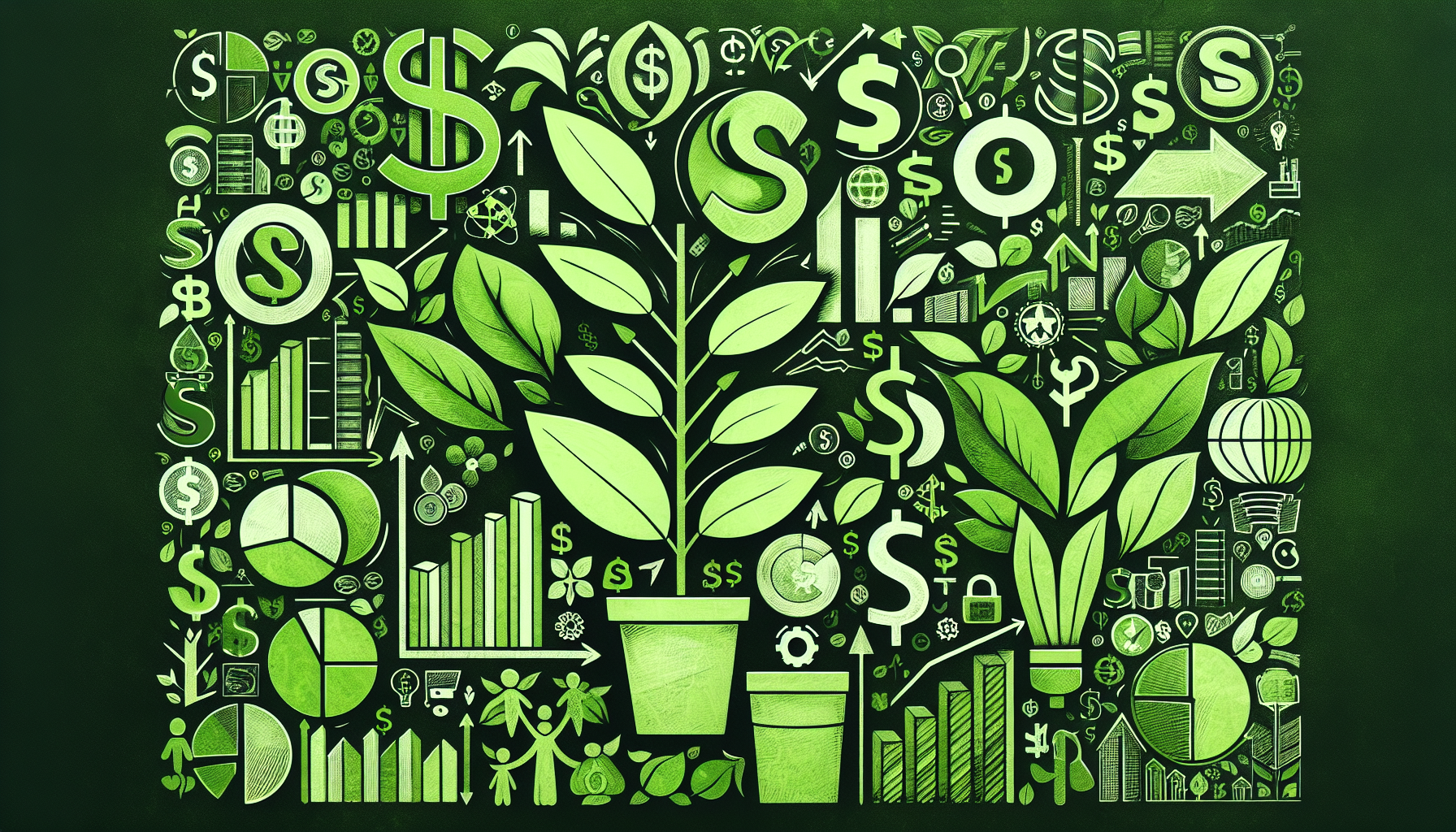Creative esg fund names that make a difference
ESG fund names reflect a growing investment trend focused on environmental, social, and governance factors, which align financial goals with sustainable practices to create positive societal impact.
Esma esg fund names are gaining traction as investors increasingly seek sustainable options. But what makes these funds stand out in a crowded market? Join us as we delve into their impact on both investment returns and social responsibility.
Understanding ESG and its significance
Understanding ESG (Environmental, Social, and Governance) is crucial for modern investing as it encompasses the three key factors to evaluate the sustainability and ethical impact of investments. By focusing on environmental criteria, investors consider how a company performs as a steward of nature. This includes policies addressing climate change, waste management, and resource conservation. The social aspect evaluates how it manages relationships with employees, suppliers, customers, and communities. This involves labor practices, diversity efforts, and community engagement.
Governance deals with a company’s leadership, executive pay, audits, internal controls, and shareholder rights. Investors today are demanding greater transparency and accountability, seeking to align their investments with their values. Understanding these criteria helps investors identify companies that prioritize sustainability and ethical practices, potentially leading to long-term financial success.
Moreover, incorporating ESG factors into investment decisions has shown to enhance portfolio performance while reducing risk. With increasing awareness of societal issues, companies that excel in ESG practices often gain stronger reputations and customer loyalty. Therefore, investors must not only rely on traditional financial metrics but also consider ESG criteria to make informed and responsible investment choices.
Types of ESG funds available
There are several types of ESG funds available, each catering to different investment strategies and objectives. One common type is the Broad ESG Fund, which invests in a diverse range of companies meeting specific environmental, social, and governance criteria. These funds typically offer a well-rounded exposure to various sectors, allowing investors to support sustainability across industries.
Another popular option is the Thematic ESG Fund. These funds focus on particular themes such as renewable energy, gender equality, or sustainable agriculture. They target companies leading the way in these specialized areas, appealing to investors passionate about specific social or environmental issues.
Negative Screening Funds apply exclusionary criteria to eliminate industries or companies involved in practices deemed unethical, like fossil fuels or tobacco. This allows investors to align their portfolios with their values by avoiding sectors they find conflicting with their personal ethics.
Additionally, Impact Funds aim to generate measurable social or environmental impact alongside financial returns. That may include investing in organizations dedicated to improving community health, education, or infrastructure. Understanding these various types of ESG funds is essential for investors aiming to align their financial goals with their values.
How to choose the right ESG fund
Choosing the right ESG fund involves understanding several key factors that align with your values and financial goals. Begin by identifying your personal investment objectives. Consider whether you are looking for growth, income, or a combination of both. Next, analyze the fund’s investment strategy. This includes assessing whether the fund utilizes negative screening, positive screening, or impact investing to select its assets.
Another important aspect to examine is the fund performance. Review historical returns compared to benchmarks. While past performance does not guarantee future results, it provides insights into the fund’s consistency in achieving its objectives. Additionally, pay attention to the fund’s expense ratio. A lower expense ratio can lead to higher returns over time, especially in ESG investing, where the focus may be on long-term growth.
Research the fund manager’s expertise and commitment to sustainability. Understanding their approach to ESG criteria indicates how focused they are on these essential factors. Finally, consider diversifying your investment. Investing in multiple ESG funds across different sectors can help mitigate risks while supporting various environmental and social initiatives. By evaluating these elements, you can make a well-informed choice that resonates with your values.
Trends in ESG fund investments
Current trends in ESG fund investments reflect a growing commitment to sustainability and responsible investing. More investors are recognizing the potential of ESG factors to influence long-term performance and drive positive change. A prominent trend is the increasing inflow of capital into sustainable funds, as many individuals and institutions seek to align their investment portfolios with their ethical values.
Another significant trend is the emergence of data and technology in evaluating ESG metrics. Enhanced analytics platforms and big data are enabling fund managers to assess companies’ ESG performance better. This shift allows for informed decision-making based on robust quantitative data rather than subjective assessments.
The demand for transparency continues to rise. Investors are favoring funds that provide detailed reports on their ESG strategies and performance, reflecting a desire for accountability. Additionally, there is a notable interest in impact investing, where fund managers focus on generating measurable social and environmental benefits alongside competitive financial returns.
Furthermore, the influence of regulatory frameworks and emerging standards for ESG disclosures is shaping investment strategies. As regulations evolve, companies and investment firms are increasingly pressured to adopt transparent and sustainable practices, making ESG considerations integral to their operations.
Challenges facing ESG investing
ESG investing has gained popularity, but it faces several key challenges that investors must navigate. One significant issue is the lack of standardization in ESG criteria and rating systems. Different ratings agencies often use varying metrics and methodologies, leading to inconsistency in how companies are assessed. This can create confusion for investors trying to compare funds or companies on ESG performance.
Another challenge is the limited availability of reliable data. Many companies do not disclose comprehensive ESG information, making it difficult to evaluate their commitment to sustainability. Investors may struggle to find accurate data that reflects the true impact of their investments on environmental and social factors.
Additionally, the risk of greenwashing is prevalent. Some companies may exaggerate their ESG efforts or provide misleading information to appear more sustainable than they actually are. This fraudulent behavior undermines the integrity of ESG investing and makes it harder for genuine sustainably-focused companies to shine.
Lastly, there can be performance-related concerns. While many studies show that ESG funds can perform well, some investors fear that prioritizing ESG factors might compromise financial returns. Balancing ethical investing with the pursuit of profits remains a complex dilemma for many in the investment community.
Future outlook for ESG funds
The future outlook for ESG funds appears promising as more investors prioritize sustainability and ethical investing. A marked shift in consumer behavior is driving companies to adopt responsible practices, encouraging fund managers to integrate ESG criteria into investment decisions. As awareness of climate change and social responsibility grows, ESG funds are likely to attract a larger share of investment capital.
One key factor influencing this trend is the expected increase in regulatory frameworks. Governments around the world are implementing stricter regulations regarding environmental reporting and corporate governance, compelling companies to enhance their transparency and accountability. This regulation-driven approach will bolster investor confidence in the sustainability of ESG investments.
Additionally, advancements in technology and data analytics are set to improve the measurement of ESG performance. Enhanced tools will provide investors with better insights, helping them to identify genuinely sustainable businesses while minimizing the risk of greenwashing.
The demand for impact-focused investing is also on the rise. As investors increasingly seek measurable impacts alongside financial returns, funds that demonstrate clear social and environmental benefits will likely gain traction. The continued growth of ESG funds reflects a broader movement toward integrating purpose with profit, positioning these investments at the forefront of the financial landscape.
In Summary: The Future of ESG Investing
Investing in ESG funds is more than just a trend; it reflects a shift towards making a positive impact on our world. As people become increasingly aware of environmental and social issues, ESG funds are gaining popularity. This growth suggests that more investors are committed to aligning their money with their values.
Challenges like data inconsistency and greenwashing exist, but with advancements in technology and regulation, these issues can be tackled effectively. The future of ESG investing looks bright, with a focus not only on financial returns but also on the impact investments can create.
By choosing ESG funds, investors can contribute to a sustainable future while also working towards their financial goals. In essence, ESG investing allows people to make a difference, proving that finance and responsibility can go hand in hand.
Frequently Asked Questions
What are ESG funds?
ESG funds are investment funds that consider environmental, social, and governance factors in their investment decisions, aiming to promote sustainability.
Why should I invest in ESG funds?
Investing in ESG funds allows you to align your investment portfolio with your values, potentially while also achieving competitive financial returns.
What challenges do ESG investors face?
Challenges include inconsistent data across ESG ratings, the risk of greenwashing, and concerns about balancing ethical investing with financial performance.
How do I choose the right ESG fund for my portfolio?
To choose the right ESG fund, assess your investment goals, research the fund’s strategy, and analyze its performance history and fees.
Are ESG funds more expensive than traditional funds?
Some ESG funds may have higher fees due to active management and research costs, but many investors find the long-term benefits outweigh these initial costs.
What is the future outlook for ESG investing?
The outlook for ESG investing is promising, with increasing investor demand, improved data transparency, and growing regulatory support for sustainability.






